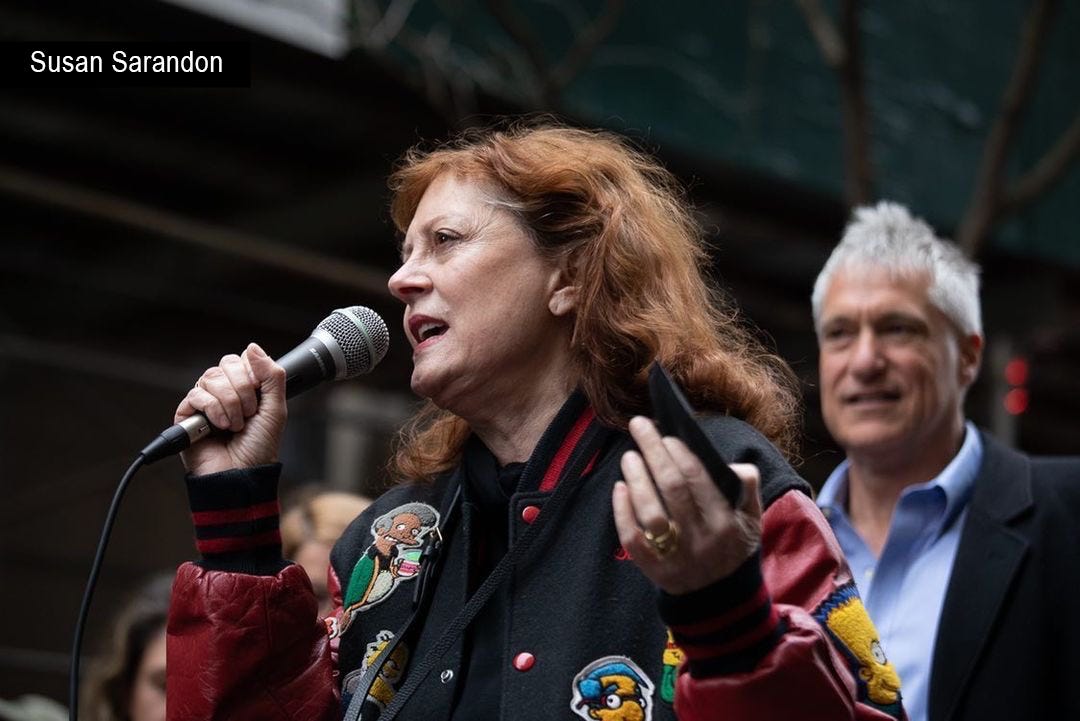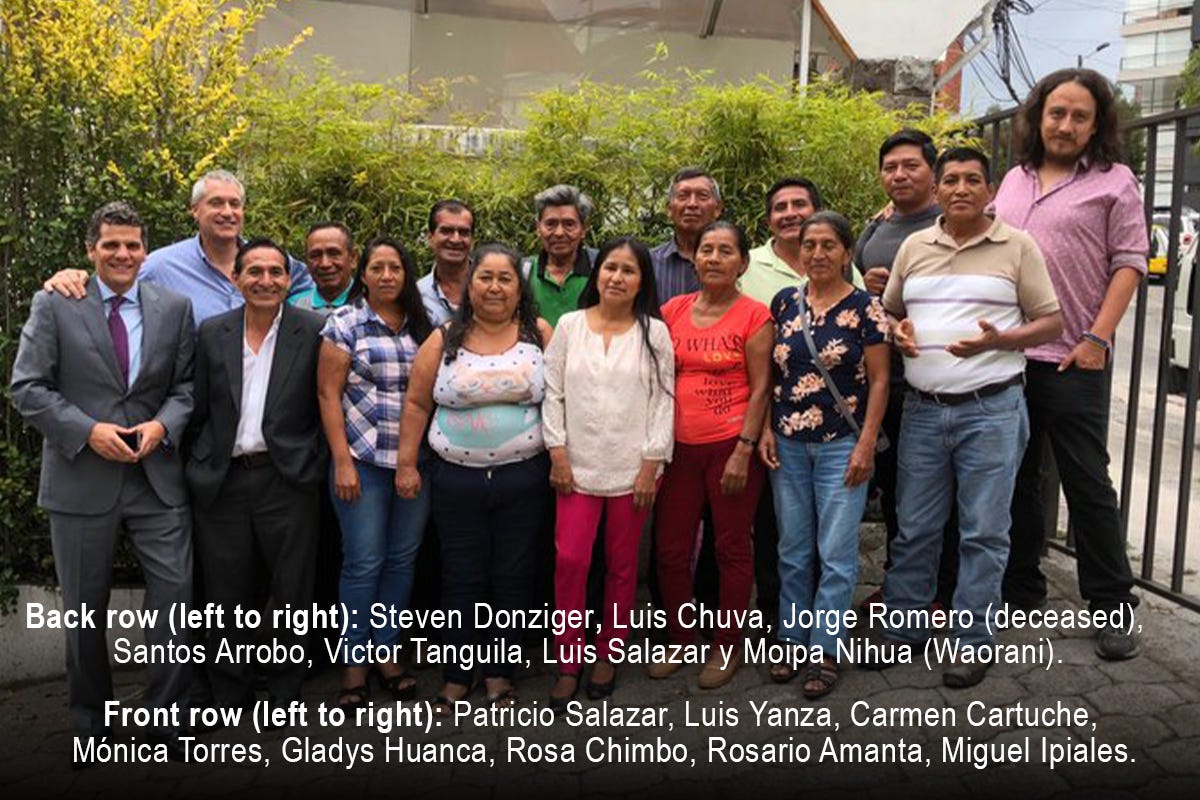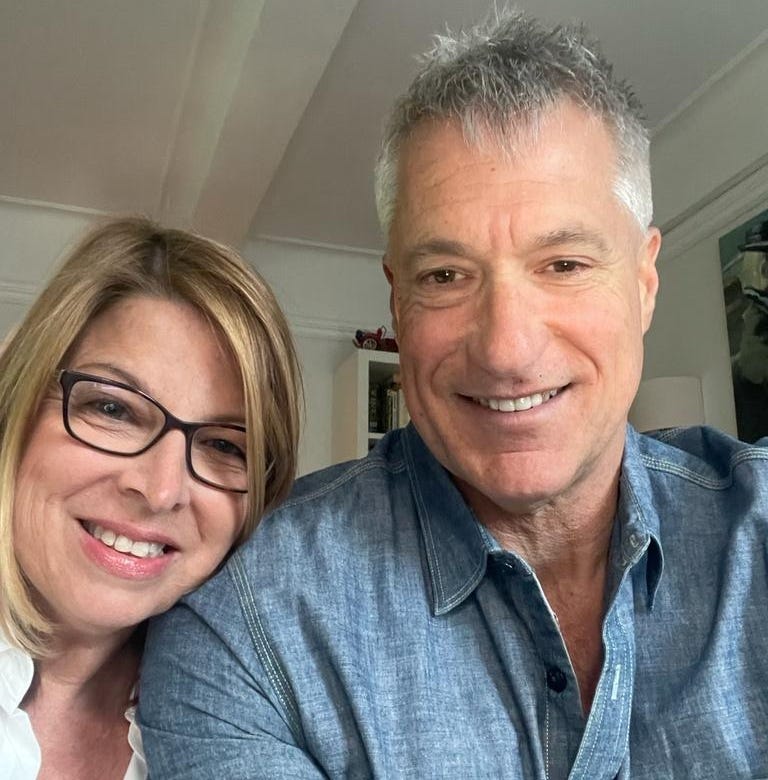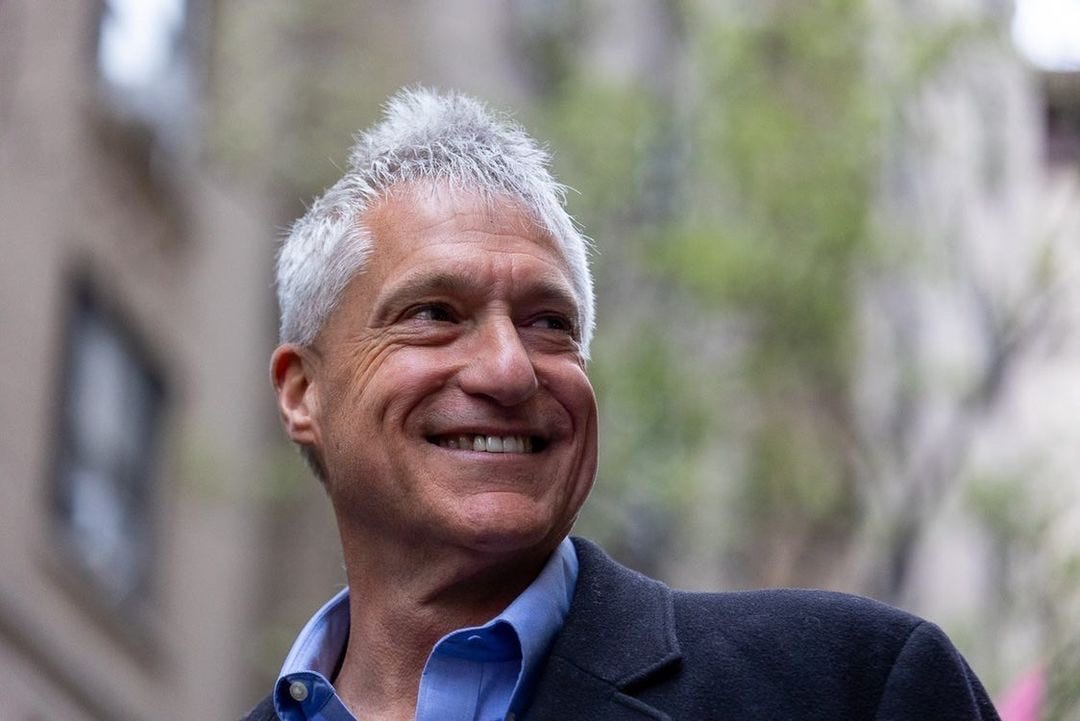First Days of Freedom: Deep Emotions, Heartbreak, and an Outpouring of Support
Friday, May 6th 2022

I am writing to you in a state of awe, disbelief, joy, and heartbreak. I just finished my first few days of freedom after 993 consecutive days detained at home or in prison. Thank you for being here, for joining me and the Amazon communities on this profoundly important journey, and for your activism to make our world better.
For those of you new to this journey, I am the only lawyer in American history ever detained for even one day in prison for the misdemeanor contempt charge lodged against me; I am the only person ever prosecuted and detained by a private corporation, in this case Chevron; and the United Nations has determined (via its Human Rights Counsil) that my detention was arbitrary and violated multiple provisions of international law. But that’s not the point of this post.
These first days out after 993 days “down” have been stunning on many levels. The outpouring of love and support is palpable and oceanic. I started this journey in the early 1990s as a young human rights attorney just out of school with a mission to defend the Indigenous peoples and farmer communities in Ecuador’s Amazon from Chevron’s deliberate and systematic dumping of billions of gallons of toxic waste onto their ancestral lands. Years later, the Amazon communities in Ecuador and their advocates now have the support of millions of people around the world who have been deeply touched by our campaign. This moves me more than words can say. I am deeply grateful.
At the same time, the heartbreak of knowing what was lost cuts deep. I lost three years of experiences with my wife Laura Miller and son Matthew and my relatives and close friends; that’s three years of profoundly important stuff that we missed out on. A close childhood friend lost both his parents during my detention and I could not attend the funerals. Another friend’s daughter got married while I sat at home starting out the window. For three years I never felt the joy of swimming in the ocean or a pool. And then, there’s double heartbreak in knowing how thousands of Indigenous peoples and rural farmers are still suffering in the Amazon because of Chevron’s toxic dumping — suffering in many ways far worse that I did in my apartment. I believe my release is a triumph of collective will for which everyone involved deserves credit. There is little doubt in my mind that if Chevron had its way, I would still be detained.
Emotions inside of me are running in all sorts of wild directions. They swing between exhilaration at one moment and then anger at what happened. My dominant feeling is how excited I am to move our campaign forward in support of the Amazon communities poisoned by Chevron. And to build our platforms even bigger to fight more broadly for human rights and climate justice. I also realize I need to take some time to heal as I get my life back. It’s hard for me to even believe that I can go where I want, do what I want, without the ankle restraint shackled to my leg. I am just starting to believe that I can have peace of mind in knowing I can plan for the future.
To be clear, I am not 100% free. The court took my passport and has yet to return it. I cannot at this point travel outside the United States which is a huge burden for an international human rights advocate. While I was detained, Chevron orchestrated the removal of my law license without a fact hearing on the theory that my successful climate justice advocacy represented an “immediate threat to the public interest.” (I am filing a petition to get it back.) There’s also our campaign for exoneration which begins with a demand that President Biden pardon me for my contempt “conviction” after a private prosecution by a Chevron law firm — a demand now backed by 10 Congresspersons and 120 environmental and human rights organizations (including Amnesty International) representing tens of millions of people around the world.
There is much work to do as we enter this new phase of the journey.
A special letter from the true heroes in the Amazon
Within hours of my release I received a letter from leaders of the Indigenous peoples and farmer communities in Ecuador who have been fighting for decades to obtain justice from Chevron. I’ve taken at least 250 trips to this region over the last two decades; I know many of these people well. This letter came from the leadership of the FDA (Frente de Defensa de la Amazonia), the profoundly important civil society group in Ecuador’s Amazon that courageously has led the lawsuit against Chevron since we filed the case in 1993. I came to Ecuador in April of that year with the innocent arrogance of a young lawyer wanting to “help” these people use the law to vindicate their rights. Over the years, I learned far more from them about life than they ever learned from me about law. This letter moved me deeply.
People often ask if I talk to my clients when I am in New York. I do so on a regular basis via phone or Zoom. The picture of me and many of the clients above was taken in November 2018 during one of my last trips to the country prior to my detention via Chevron’s private prosecution. I had no idea when this photo was taken that there was even a scintilla of a possibility of being locked up. You can see me in the back left of the second row. Directly in front of me is one of my best friends: Luis Yanza, winner of the 2008 Goldman Environmental Prize, and maybe the one indispensable figure on our team who has brilliantly and tirelessly led this case from beginning to end at the community level. In 1995, when few cared about this crisis, I saw Luis throw pebbles at the window of the office of Ecuador’s Attorney General in Quito after he refused to meet with the FDA leadership and instead took Chevron’s side in the case.
Here is the text of the letter I received just hours after I was released on April 25:
“Dear Steven,
Today is a historic day in our struggle for justice, and for that we are very happy. Your liberation is a historical fact after almost one thousand days of suffering; we too were suffering although not like you and your family, who were the direct victims of Chevron's persecution. However, just the same, thousands of people have been suffering for more than four decades from the diseases caused by the toxins that Texaco left on our lands. Even many comrades who started this fight almost 30 years ago have already died: Rosa, Alejandro, Oscar and many others. In memory of them we must continue fighting until Chevron is forced to pay to repair the damage in the Ecuadorian Amazon.
Your release gives us hope and strength to continue the fight together, as a team. In the coming months we hope to see you again here, in Ecuador, to give us a supportive hug, but above all, to give us strength and energy.
In the name of old friends and comrades in struggle, we thank all the people, organizations and groups that supported Steven. At the same time, we invite you to continue supporting the cause of the affected Ecuadorians. Our resistance to Chevron is to protect all life and all humanity; but also to protect Nature and Mother Earth, which were deeply affected by Chevron’s contamination.
Thank you Steven for your commitment to our cause! Thank you to all the people for supporting Steven and his family! Thank you for joining our campaign to fight for life and human rights!
Signed,
The “Caducos” (historic leaders of the struggle)
Carmen, Medardo, Gladys, Santos, Gilber, Wuilmo, Marcos, Manuel, Ermel, Luis, Jose, Hugo and others
Freedom means more now that I experienced detention
My newfound freedom hit me in various ways. It forced me to finally feel how devastating detention was in ways I could not bring myself to confront at the time. While at home I was always on edge, but I found a way to carve out a productive existence – something I noticed many of my fellow inmates do in prison under far more difficult circumstances even when they face decades of time.

Last weekend, I took my son to my hometown in Northeast Florida. It was my first plane ride in almost three years. It was a joy to be home. A joy to see my childhood friends who never doubted nor wavered. And most importantly, a joy to be with my son in a milieu outside our little apartment in Manhattan. We went to the beach and talked extensively about things with a lightness in our beings — a lightness that neither of us had felt in years. It was both joy and heartbreak thinking about what was gained and what was lost.
Every day in detention I felt a simmering anxiety. I could never completely relax. Never could get my head out of being imprisoned. I always thought I was a just a few days or weeks away from getting the ankle bracelet removed. Nobody had ever heard of a lawyer being locked up in home to await trial on a misdemeanor in a case rejected by the federal prosecutor. Nothing made sense. It was a cruel game that Chevron and its lawyers played.
I always was trying to advance the ball – to build awareness, to get public support, to push and encourage my lawyers, to build community on social media, and to raise funds so we could survive and get stronger. They wanted to crush me into some form of surrender; I was determined to do the opposite. They wanted to destroy my family; they failed. My wife Laura Miller (below in photo) has been a rock and played the most critical role in extracting me from prison early to serve the rest of my sentence at home. Largely because of the support of my family and all of you, we definitely succeeded. We now are far stronger than we were prior to my arrest and detention.
The more Chevron attacks, the stronger we seem to get
After my detention in August 2019, my first lawyer told me to lay low and not to fight my arrest publicly. He told me to drop my civil appeal of the order I turn over my computer and cell to Chevron as a way to appease the court. I tried that on for size for three months. It not only was ineffective, it was not authentic to me.
My decision to build community and speak out publicly against Chevron, the judges, and my private prosecutor from the Chevron law firm Seward & Kissel helped in more ways than I could have imagined. I deeply engaged social media from detention and went from 2,000 followers on Twitter to more than 194,000 today. I also have 31,000 followers on Instagram; I had a few hundred when I was arrested. I now have an email list of supporters with more than 125,000 names. In a typical month, tens of millions of people see my posts. The growth in awareness of Chevron’s pollution in the Amazon and its unjust attacks on me has been spectacular.
I also used my time in detention to engage independent media directly. I set up a small studio in our apartment. It was clear The New York Times, the U.S. broadcast networks, and other major U.S. media dependent on fossil fuel advertising were intimidated by Chevron and would not cover the story of an American human rights lawyer jailed in his own country. The NYT was hopelessly conflicted; it used the same Gibson Dunn law firm that Chevron was paying to demonize me and try to destroy my life.
I focused on working with media not subject to corporate censorship. I spoke about my detention and Chevron’s environmental crimes on podcasts with Katie Halper, Chris Hedges, Michael Moore, Krystal Ball, Marianne Williamson, Will Menaker of Chapo Trap House, Ralph Nader, Jordan Chariton, Briahna Joy Gray, Matt Taibbi and others. On the print side, Sharon Lerner at The Intercept and James North of The Nation did a fabulous job covering the case. Again, countless people around the world gained access to the story of Chevron’s environmental crimes in Ecuador and the company’s unjust (and I believe illegal) private prosecution of me in the name of the U.S. government.
I feel a huge release
When the monitoring device first was shackled to my left ankle, I told my son (then 13) that it would probably come off in about two weeks once I got a lawyer and we went back to court. No lawyer had ever spent even a day detained like this pre-trial for a contempt charge. But Judges Loretta Preska and Lewis Kaplan had something else in mind for me that in my view had nothing to do with the law and everything to do with abusing the law to serve the interests of the fossil fuel industry. Their goal was to turn me into a weapon of intimidation so no lawyer or campaigner would follow in our footsteps, despite the worsening climate crisis. I’ll add that both judges had ties to Chevron. Kaplan had investments in Chevron via a mutual fund, and Preska was a leader of the Chevron-funded Federalist Society.
The summer months with nice weather were particularly difficult. I would stick my head out the window of our 7th-floor apartment while reading the newspaper to try to get a feel for the outdoors and some sun on my face. Nobody was around; I could not leave with my son and very few people came by to visit. When Matthew’s friends came, I had to cover my ankle shackle with a blanket or long pants to save him the embarrassment. Over time, his friends and many of their parents learned of my detention and became a huge source of support for me and our family.
I tried everything with my lawyers to get the shackle off; nothing worked. We went to Judge Preska five times; she turned us down each time claiming I might flee to Ecuador and hide out with my clients in the jungle to avoid a misdemeanor sentence. We went to the appellate court twice. Every judge and court in New York seemed invested in protecting the decision to lock me up. I felt like I could never get a fair hearing. It was a closed loop and I was not allowed entry. It felt like they were all in on the Chevron strategy to “demonize” Donziger and try to criminalize legitimate human rights advocacy.
In prison, I gained a series of deep and rich experiences
My 45 days in federal prison got me in touch with elements of humanity and strength I did not know existed. I was never scared of going to prison; I was scared that once in, I might be harmed or even killed (more on that in another post) or not given adequate medical attention if I fell ill. Yet in this most harsh of environments, I saw humanity triumph over institutional brutality time and time again. It was a profound education in the power of the human condition. Prisoners pulled together to help each other write legal briefs, testify in disciplinary hearings, and run our “M” unit with a degree of compassion. I found there was more respect between people on the inside than between people on the outside; that’s what happens when everyone is in a confined space. And there was enormous creativity in exercise, gambling on sports events, writing poetry, and collaborating on court documents. And to get fresh vegetables — see this post.
We have created something that goes way beyond one person
This is not just about me or the Ecuador case. It’s about all of us trying to help vulnerable communities in the South who have little voice but with whom we unite to protect our planet. Our “Freedom Rally” on Monday of last week (the day I was released) on the street below my apartment was an extraordinary illustration of this dynamic. As Amazon labor organizer Chris Smalls said: “No matter how many millions of dollars they spend on consulting firms, you can’t beat the power of people.”
Speeches from Harvard Law Professor Charles Nesson, Susan Sarandon, the great lawyers Marty Garbus and Ron Kuby, Chris Smalls, political leader Lindsay Boylan, artivist Giada Lubomirski, my wife Laura Miller, Katie Halper and so many others created a massive energy force and illustrated the amazing breadth of our support. Watch the compilation video below and see the pictures at the end of this post.
Thank you so much for reading this and for joining me here as we try to broaden our community. I am incredibly excited about where can all go next — and together. I will be posting again in a few days.













Glad you are finally free. Now we must free Julian Assange.
I'm not sure if I should congratulate or commiserate with you... probably both are appropriate. You are a person of impeccable principle and you have sacrificed a lot, not only for the indigenous people of the Amazon, but for the rights of all people over that of psychotic corporations. They are psychotic, as are the people who operate and profit from their criminal activities. You have my complete admiration and respect. I wish you and your family every happiness and success for the future.